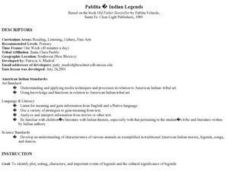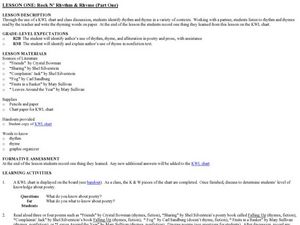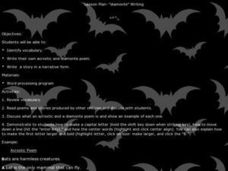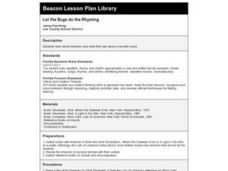Curated OER
Acrostic Book Report
Students read the story Wild Horse Winter and construct acrostic poems. In this poetry lesson, students use adjectives and events in the text to develop an acrostic poem.
Curated OER
Thanksgiving Acrostic Poems
Students watch streaming video, Holiday Facts and Fun: Thanksgiving, define and discuss acrostic poetry, complete circle map using words associated with Thanksgiving, and create acrostic Thanksgiving poems to be typed in Microsoft Word...
Curated OER
Pablita Indian Legends
Scholars are introduced to the characteristics of a legend. They read and discuss Old Father Story Teller by Pablita Velarde. Then, in groups, they write and illustrate a poem based on one of the legends from the book. This lesson plan...
Curated OER
Poetry to the Core
Second graders examine several examples of poetry in the six lessons of this unit. The lessons focus on five poetic forms, couplets, quatrains, limericks, Haiku, and free verse.
Curated OER
What is a Haiku? How Do You Write a Haiku?
Haiku poetry is explored in this language arts lesson. Yong readers identify the characteristics of haiku and read several examples. Students make connections between their study of Japan and the poetic form of haiku, and they write...
Curated OER
Arthur Meets the President - Lesson 5
Learners type acrostic poems. In this poetry lesson, students read stories and poems written by other children and use a word processing program to type their own acrostic poems.
Houghton Mifflin Harcourt
Nature Walk: English Language Development Lessons (Theme 2)
Walking in nature is the theme of a unit designed to support English language development lessons. Scholars look, write, speak, and move to explore topics such as camping, woodland animals, instruments,...
ReadWriteThink
Word Recognition Strategies Using Nursery Rhymes
As a class, scholars read the poems, Humpty Dumpty, Peter, Peter, Pumpkin Eater, and Jack and Jill, in order to identify words with the same ending sound. Using their rhyming skills, learners brainstorm additional words...
Curated OER
The Sand Crab
In this rhyming words worksheet, learners read a poem to discover the lines that rhyme. Students identify two lines that rhyme.
Curated OER
Color Poems
Students listen as the teacher reads several poems from the book "Hailstones and Halibut Bones," "My Many Colored Days," and a teacher created poem. Students choose a color and share some brainstorming ideas with the class. They write a...
Curated OER
The Nature of Haiku Poetry
Students brainstorm elements of nature art prints and photos. They identify the syllable count of Haiku and take a nature walk. They write Haiku poems while practicing the use of simile, alliteration, metaphor, and analogy to describe...
Curated OER
Weather Patterns
Second graders discuss how their weather changes by examining temperatures, clothing needs, and plant life. They talk about the identifying factors of the seasons and complete a Venn Diagram about weather in a guided instructional...
Curated OER
Lesson One: Rock N Rhythm & Rhyme (Part One)
Second graders listen to poetry to find rhyme and rhythm. In this poetry lesson plan, 2nd graders listen to different types of poetry and find how they are alike. They look for rhyming words and create their own rhymes.
Denver Art Museum
Descriptive Haiku
Even though this is technically an art lesson, haiku poetry is actually the main focus! Learners view photographs of Japanese tea caddies. They list five descriptive words for the caddies, then write haiku poems using the caddies as...
Curated OER
Focus Story: The Mitten
Students explore language arts by analyzing a story with their classmates. In this poetry identification lesson, students read the book The Mittens and identify the characters, plot and settings in the story. Students recite poems about...
Curated OER
Diamonte Writing
Students discover poetry while practicing their storytelling skills. In this language arts lesson, students read diamonte and acrostic poems written by other students on the Internet. Students create their own narrative...
Curated OER
What's In A Name
Second graders read Chrysanthemum by Kevin Henkes. They then discuss where various names come from. They create a individualized biopoem and publish it on word processing software. Their poems are compiled into a class book and presented...
Curated OER
Let the Bugs do the Rhyming
Students listen to limericks and write their own about a favorite insect.
University of Virginia
It's Thanksgiving
Students complete a variety of activities related to poems from the book "It's Thanksgiving" by Jack Prelutsky. They create a Thanksgiving turkey using construction paper, identify what they are grateful for, and create a Thank You...
Curated OER
Money
Students count money using only coins. In this money lesson, students read Bennies Pennies, practice counting the pennies in the story and are then introduces to the different coins, penny, nickel, dime and quarter. Students...
Alabama Learning Exchange
Our Solar System
Second graders research the Solar System using the Internet to complete questions. They sing The Planet Song and study the names of the planets using an acrostic poem. They write descriptive paragraphs with a partner with whom they check...
Curated OER
Review of the Five Senses
Students investigate the five senses. In this human biology instructional activity, students are given five items and identify which items match best with each of the senses. Students use objects such as a rock, hard candy, and a flower.
Oklahoma State Department of Education
Sandwich Feast
Creative! Youngsters listen to the reading of "Recipe for a Hippopotamus Sandwich" by Shel Silverstein as a warm up activity for a lesson in punctuation. They use bread-shaped pages, one for each type of punctuation, to identify which...
Curated OER
Joseph Raffael
Learners examine and discuss a painting of a lizard by the artist Joseph Raffael. They list descriptive words about the lizard, and write a Cinquain and create a painting about a lizard.

























